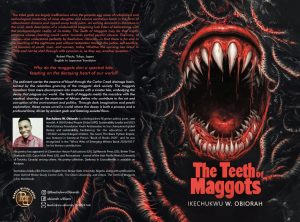By Robert Frost
Every string holds significance in weaving the colors of heart and soul, combining human experience to transcend into universality. “The Teeth of Maggots” is no different. It gnaws, it unsettles, and ultimately, it transforms. Ikechukwu W. Obiorah knits words with the grace of color, painting vivid emotions that linger in the heart and soul. He resonates with depth, capturing the essence of human experience in each line. A true Nigerian author and poet, Obiorah wields language as both a tool and a weapon, carving through illusions to reveal raw, unfiltered truth.
Poetry, at its finest, does not soothe. It gnaws at the core of existence, reflecting the truth of experience. “The Teeth of Maggots” embodies this essence. But what happens when the maggots no longer wait for death to take its course? When decay is no longer an aftermath but a force—creeping, gnawing, reshaping the very bones of existence? In this collection, Obiorah wields poetry like a scalpel, slicing through the veils of silence and exposing a civilization festering beneath its gilded surface. These are not verses for idle reflection. They are incantations conjuring a world where the sediment carries the essence of blood, where rot is not just the final stage but an ever-hungry entity. The maggots here are more than insects. They are symbols of corruption, of power left unchecked, of a society consuming itself from within.

Yet, within this macabre imagery lies an undeniable elegance. These poems do not merely destroy. They resurrect, like the maggots that feed on decay only to give way to renewal. The poet does not mourn corruption and loss as irreversible tragedies. Rather, he turns them into fertile ground for reflection and rebirth. In these verses, the past is devoured so that something new may grow in its place. “The Teeth of Maggots” is a collection that demands to be consumed, each word a bite, each metaphor a gnashing tooth, until the reader emerges altered, confronted by an unsettling beauty they cannot ignore.
This is poetry that refuses to look away. Instead of merely observing life, the poet dissects it with precision, exposing its throbbing core. The imagery solidifies into folklore, voices of the forgotten echoing through the crevices of history, maggots sinking their spectral teeth into the marrow of a living world. These verses force the reader to confront the inevitable cycles of destruction and renewal that shape both individual lives and entire societies.
At the heart of this collection lies a deep reflection on transience. The poet crafts verses that mirror the fleeting nature of existence, the certainty of death, and the resilience of the human spirit. Both lamentation and hymn, these poems celebrate the stubborn act of remembrance while acknowledging the inevitable decay imposed by time. Here, the maggot, typically a symbol of destruction, becomes an agent of transformation, devouring the past while nourishing the future.
This dichotomy recurs throughout the work, reflecting the reality of a land that has endured economic hardship, political unrest, and colonial wounds, yet continues to rise and reinvent itself. From Christopher Okigbo’s lyrical magic to Niyi Osundare’s sharp societal critiques, “The Teeth of Maggots” stands as a testament to Nigeria’s rich poetic heritage. Yet, the poet carves a voice distinctly his own, bridging the guttural with the sacred, the ancestral with the avant-garde. This is poetry as prophecy, prayer, protest, and incantation.
It is an honor to introduce “The Teeth of Maggots“, a remarkable creation that will echo in the literary landscape long after the last page is turned. May it invade your consciousness, chew at your thoughts, and remind you that poetry is alive, persistent, and unwavering, even in the face of decay.
Dr. Pranjit Sarma, MA (Eng.), MA (C&J), Ph.D., is Assistant Professor, Maibang Degree College, Assam, India.